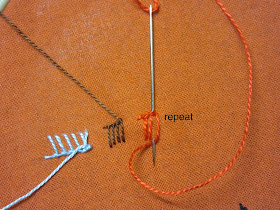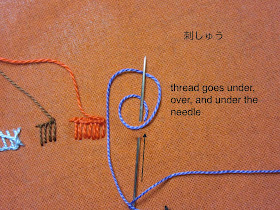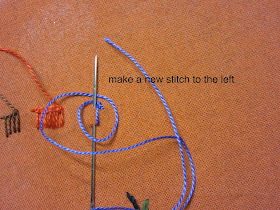Here is your last lesson of historic stitches, well for the time being at least.
We are looking at a stitch in one of the most controversial stitch families, Tailor's Buttonhole Stitch of the Buttonhole-Blanket Clan.
For further reading about the Buttonhole and Blanket stitches, how they differ and how their names cause so many discussions, please check out Mary Corbet's article at Needle 'n Thread.
(My impression is that on a hand hemmed blanket, where the space between the bars is wide, the stitch might be called Blanket Stitch.
The same stitch, worked tightly together, just like the enforcement stitching around a buttonhole would be Buttonhole Stitch, ...
BUT for embroidery I use the term Buttonhole Stitch whatever the spacing!)
Now, let's focus on the Tailor's Buttonhole Stitch.
French names: point de feston tailleur or point de boutonnière.
I have had a look at several of my stitch dictionaries and found various alternatives.
These five books contain five different directions for the stitch, sometimes resulting in the same look, sometimes with a totally different appearance.
First out is
Mary Thomas's Dictionary of Embroidery Stitches
The Embroidery Stitch Bible
teaches this method
(brown thread)
In
Reader's Digest Complete Book of Embroidery
(red thread)
the knotted edge is very pretty

Japanese book called Shishu (刺しゅう)
(blue thread)

Another Japanese book, Kiso-no-stechi, (基礎のステッチ) (Basic Stitches)

- Four of them are worked from left to right, only the blue is worked right to left.
- Two of them have the knots at the bottom, three at the top
- In the first three you stitch towards you, in the two Japanese stitches (the last two) the needle is inserted away from you
- In the red stitch the knots have a nice knitted look
So the HOMEWORK will be to:
Try them all out
Pick a favorite
Work a row on the Aida sampler
Fill in a square on the Sunday Stitch School Reference Chart
Make a couple of button holes or
Play around with free form embroidery
























There's often more than one way to do something, but five ways! I look forward to seeing which one you like best.
ReplyDeleteI will test the stitches both on a solid piece of fabric and on the edge of a cut-open buttonhole.
ReplyDeleteWho would have thought there were so many ways for one stitch, but I
ReplyDeletethink I do mine different to all those.
Don't tell me there are more ways!
DeleteGosh. I never realised how differently some of these turned out!
ReplyDeleteThe red, with the knitted edge was the most difficult to work. I wonder how it is to stitch it on an edge or cut open buttonhole.
DeleteAmazing! This comparison is so interesting, and your pictures make the stitch pattern differences so clear :)
ReplyDeleteHello, and thank you for your kind comment.
DeleteIt IS interesting to compare different methods to get the same result, or indeed a totally different finish, but with the same name.
Dans le Mary Thomas en français il est traduit par :
ReplyDelete- point de feston tailleur
mais il est plus couramment nommé :
- point de boutonnière
Voilà
A bientôt
Mattia
Thank you Mattia, I'll update with your French names.
DeleteGood clear photos. That's a specialized stitch with a long history as you've brought out!
ReplyDeleteI'll be waiting to see what you come up with Queenie.
I have now heard from two readers who talk about two more ways to stitch a buttonhole!
Delete